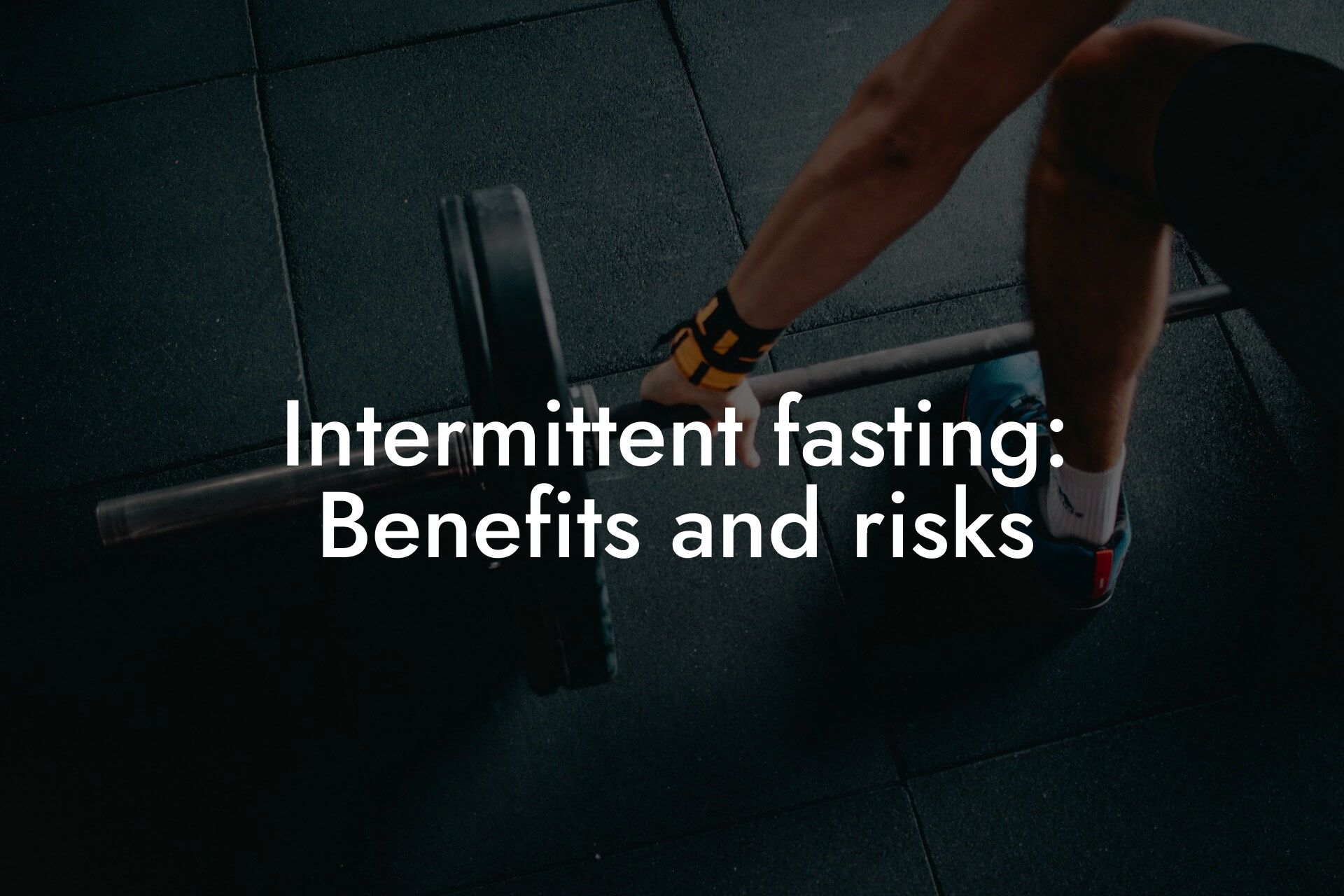As high-earning professionals, you understand the significance of maintaining a healthy and strong physique. One crucial aspect of overall health that is often overlooked is bone health. Strong bones are essential for supporting your body's structure, enabling you to perform daily tasks, and enjoying an active lifestyle. However, as we age, our bone density naturally decreases, increasing the risk of osteoporosis, fractures, and other bone-related disorders. In this article, we will explore the importance of eating for bone health and provide you with a comprehensive guide on how to optimize your diet for stronger bones.
Table of Contents
The Role of Nutrition in Bone Health
A well-balanced diet plays a vital role in maintaining healthy bones. The food we eat provides our bodies with the necessary building blocks to build and repair bone tissue. A diet rich in essential nutrients such as calcium, vitamin D, and other minerals can help promote bone growth, density, and strength. On the other hand, a diet lacking in these nutrients can lead to weakened bones, increasing the risk of osteoporosis and fractures.
Essential Nutrients for Bone Health
There are several essential nutrients that are crucial for maintaining healthy bones. These include:
Calcium: Calcium is the most abundant mineral in the body and is essential for building and maintaining strong bones. Foods rich in calcium include dairy products, leafy greens, and fortified plant-based milk.
Vitamin D: Vitamin D is necessary for the absorption of calcium and plays a crucial role in maintaining bone health. Foods rich in vitamin D include fatty fish, egg yolks, and fortified dairy products.
Phosphorus: Phosphorus is another essential mineral that helps build and maintain strong bones. Foods rich in phosphorus include meat, fish, eggs, and dairy products.
Magnesium: Magnesium is important for bone mineralization and density. Foods rich in magnesium include dark leafy greens, nuts, and whole grains.
Potassium: Potassium helps regulate calcium metabolism and is essential for maintaining healthy bones. Foods rich in potassium include bananas, avocados, and sweet potatoes.
Foods That Support Bone Health
In addition to the essential nutrients mentioned above, there are several foods that can help support bone health. These include:
Fatty Fish: Fatty fish such as salmon and mackerel are rich in vitamin D and omega-3 fatty acids, which can help reduce inflammation and promote bone health.
Leafy Greens: Leafy greens such as kale, spinach, and broccoli are rich in calcium and other minerals essential for bone health.
Nuts and Seeds: Nuts and seeds such as almonds, sesame seeds, and chia seeds are rich in magnesium and other minerals that support bone health.
Fermented Foods: Fermented foods such as kimchi, sauerkraut, and yogurt contain probiotics, which can help promote calcium absorption and bone health.
Foods That Can Harm Bone Health
While a well-balanced diet can help promote bone health, there are certain foods that can harm bone health. These include:
Sodium-Rich Foods: Consuming high amounts of sodium can lead to calcium loss in the urine, increasing the risk of osteoporosis.
Caffeine: Excessive caffeine consumption can interfere with calcium absorption and increase the risk of osteoporosis.
Phosphoric Acid: Phosphoric acid, found in some soft drinks, can lead to calcium loss and increase the risk of osteoporosis.
High-Protein Diets: While protein is essential for bone health, excessive protein consumption can lead to calcium loss and increase the risk of osteoporosis.
Meal Planning for Bone Health
Meal planning can help ensure that you are getting the necessary nutrients for bone health. Here are some tips to help you plan meals that support bone health:
Incorporate calcium-rich foods into your meals and snacks, such as dairy products, leafy greens, and fortified plant-based milk.
Include vitamin D-rich foods in your meals, such as fatty fish, egg yolks, and fortified dairy products.
Add magnesium-rich foods to your meals, such as dark leafy greens, nuts, and whole grains.
Incorporate bone-healthy foods into your meals, such as fatty fish, leafy greens, and fermented foods.
Supplements for Bone Health
While a well-balanced diet can provide the necessary nutrients for bone health, supplements can help fill in any nutritional gaps. Here are some supplements that can support bone health:
Calcium Supplements: Calcium supplements can help ensure that you are getting enough calcium for bone health.
Vitamin D Supplements: Vitamin D supplements can help ensure that you are getting enough vitamin D for bone health.
Magnesium Supplements: Magnesium supplements can help ensure that you are getting enough magnesium for bone health.
Omega-3 Supplements: Omega-3 supplements can help reduce inflammation and promote bone health.
Maintaining strong bones is essential for overall health and well-being. By incorporating bone-healthy foods into your diet, avoiding foods that can harm bone health, and considering supplements, you can take steps to promote bone health. Remember, a well-balanced diet is just one aspect of maintaining healthy bones. Regular exercise, stress management, and adequate sleep are also crucial for bone health. By taking a holistic approach to bone health, you can maintain strong bones and enjoy an active lifestyle for years to come.
At Tano Performance Group, we understand the importance of maintaining a healthy and strong physique. Our DEXA machine provides a comprehensive body assessment, giving you the information you need to take your physical health to the next level. Contact us today to learn more about our services and how we can help you achieve your fitness goals.
Frequently Asked Questions
What is the importance of bone health?
Bone health is crucial for overall well-being, as it provides the structural framework for our bodies. Strong bones support our muscles, organs, and tissues, enabling us to move, function, and live life to the fullest. Moreover, good bone health reduces the risk of osteoporosis, fractures, and other bone-related disorders, which can significantly impact quality of life, especially in older adults.
What are the key nutrients for bone health?
The three essential nutrients for bone health are calcium, vitamin D, and phosphorus. Calcium helps build and maintain bone density, vitamin D facilitates calcium absorption, and phosphorus is involved in bone mineralization. Other important nutrients include vitamin K, magnesium, and potassium, which support bone metabolism and density.
How much calcium do I need for optimal bone health?
The recommended daily calcium intake varies by age and sex. Generally, adults need 1,000-1,200 mg of calcium per day, while adolescents and young adults require more (1,300-1,400 mg). Pregnant and breastfeeding women may need even higher amounts. It's essential to consult with a healthcare professional to determine your individual calcium needs.
What are the best food sources of calcium?
Calcium-rich foods include dairy products like milk, cheese, and yogurt, as well as leafy greens like kale, broccoli, and spinach. Other good sources are fortified plant-based milk, tofu, almonds, and calcium-set tofu. It's essential to consume a variety of calcium-rich foods to meet your daily needs.
Can I get enough vitamin D from food alone?
Vitamin D is found in limited food sources, such as fatty fish, fortified dairy products, and mushrooms. However, it's challenging to get enough vitamin D from diet alone, especially during winter months or with limited sun exposure. Consider consulting with a healthcare professional about supplementation or sun exposure guidelines.
How does exercise impact bone health?
Regular exercise, especially weight-bearing and resistance training, helps build and maintain strong bones. Exercise stimulates bone growth, increases bone density, and reduces the risk of osteoporosis. Aim for at least 30 minutes of moderate-intensity exercise per day, including activities like walking, jogging, cycling, or weightlifting.
What is osteoporosis, and how can I prevent it?
Osteoporosis is a condition characterized by brittle and porous bones, increasing the risk of fractures. Prevention strategies include maintaining a balanced diet rich in calcium and vitamin D, engaging in regular exercise, avoiding smoking and excessive alcohol consumption, and managing underlying health conditions. Early detection and treatment can also help prevent osteoporosis-related complications.
How does body fat impact bone health?
Excess body fat, particularly visceral fat, can negatively impact bone health by increasing inflammation and reducing bone density. Maintaining a healthy body fat percentage through a balanced diet and regular exercise can help support bone health.
Can bone health affect my physique?
Yes, bone health can impact your physique. Strong bones provide a solid foundation for muscle growth and development, allowing you to achieve a more toned and athletic physique. Conversely, poor bone health can lead to a loss of muscle mass and a more frail appearance.
How does bone density impact my overall health?
Bone density is a strong predictor of overall health. Low bone density is linked to an increased risk of osteoporosis, fractures, and other health conditions, such as diabetes, cardiovascular disease, and certain cancers. Maintaining optimal bone density can help reduce the risk of these conditions and promote overall well-being.
What are the risks of poor bone health?
Poor bone health can lead to a range of complications, including osteoporosis, fractures, chronic pain, limited mobility, and reduced quality of life. Additionally, poor bone health can increase the risk of other health conditions, such as osteoarthritis, diabetes, and cardiovascular disease.
How can I monitor my bone health?
Regular bone density tests, such as dual-energy X-ray absorptiometry (DXA), can help monitor bone health. Additionally, tracking calcium and vitamin D levels, as well as monitoring for signs of osteoporosis, such as back pain or height loss, can help identify potential issues early on.
What are the best exercises for bone health?
The best exercises for bone health include weight-bearing activities like walking, jogging, and jumping, as well as resistance training exercises that target multiple muscle groups, such as squats, lunges, and deadlifts. High-impact exercises like running and jumping are particularly effective for building strong bones.
Can I improve my bone health at any age?
Yes, it's never too early or too late to take steps to improve bone health. While peak bone mass is typically achieved during adolescence and young adulthood, regular exercise and a balanced diet can help maintain and even improve bone health throughout life.
How does menopause impact bone health?
Menopause can lead to a rapid decline in bone density due to decreased estrogen levels. This increased risk of osteoporosis and fractures can be managed through hormone replacement therapy, calcium and vitamin D supplementation, and regular exercise.
Can I take supplements to support bone health?
Yes, certain supplements like calcium, vitamin D, and omega-3 fatty acids can support bone health. However, it's essential to consult with a healthcare professional before adding any supplements to your regimen, as they may interact with medications or have adverse effects in certain individuals.
How does smoking impact bone health?
Smoking is a significant risk factor for osteoporosis and fractures, as it reduces bone density, impairs calcium absorption, and increases inflammation. Quitting smoking can help mitigate these risks and support overall bone health.
Can I eat too much calcium?
While calcium is essential for bone health, excessive intake can lead to adverse effects like kidney stone formation, constipation, and interactions with certain medications. It's essential to consult with a healthcare professional to determine the appropriate calcium intake for your individual needs.
How does stress impact bone health?
Chronic stress can negatively impact bone health by increasing cortisol levels, which can lead to bone resorption and reduced bone density. Engaging in stress-reducing activities like yoga, meditation, or deep breathing exercises can help mitigate these effects.
Can I improve my bone health through diet alone?
While a balanced diet rich in calcium, vitamin D, and other essential nutrients is crucial for bone health, it's unlikely to improve bone health significantly through diet alone. A comprehensive approach that includes regular exercise, stress management, and adequate sleep is necessary for optimal bone health.
How does sleep impact bone health?
Adequate sleep is essential for bone health, as it allows for bone repair and regeneration. Chronic sleep deprivation can lead to reduced bone density, increased inflammation, and a higher risk of osteoporosis.
Can I inherit poor bone health?
Yes, genetic factors can play a role in bone health, and certain genetic conditions can increase the risk of osteoporosis and fractures. However, lifestyle factors like diet, exercise, and stress management can help mitigate these risks and support overall bone health.
Here are some related articles you might love...
- Hydration and its impact on performance and physique
- Supplements that support body composition goals
- Intermittent fasting: Benefits and risks
- The importance of protein for muscle growth
- Macronutrient balance for physique enhancement
- Managing cravings and diet pitfalls
- Best diets for reducing body fat
- Nutrition tips for busy professionals
- How to meal prep for body composition goals
Zak Faulkner
Zak Faulkner is a leading authority in the realm of physical health and body composition analysis, with over 15 years of experience helping professionals optimise their fitness and well-being. As one the experts behind Tano Performance Group, Zak has dedicated his career to providing in-depth, science-backed insights that empower clients to elevate their physical performance and overall health.
With extensive knowledge of DEXA technology, Zak specializes in delivering comprehensive body assessments that offer precise data on body fat, muscle mass, bone density, and overall physique. His expertise enables individuals to make informed decisions and achieve their fitness goals with accuracy and confidence. Zak’s approach is rooted in a deep understanding of human physiology, combined with a passion for helping clients unlock their full potential through personalised strategies.
Over the years, Zak has earned a reputation for his commitment to excellence, precision, and client-focused service. His guidance is trusted by top professionals who demand the best when it comes to their health. Whether advising on fitness programs, nutritional strategies, or long-term wellness plans, Zak Faulkner’s insights are a valuable resource for anyone serious about taking their health and fitness to the next level.
At Tano Performance Group, Zak continues to lead our Content Team revolutionising how professionals approach their physical health, offering unparalleled expertise that drives real results.




